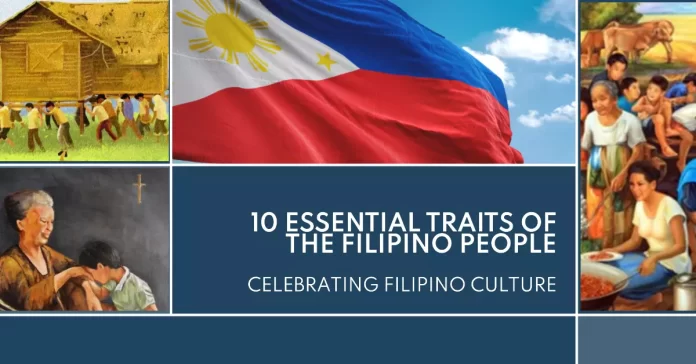The Filipino culture is rich with unique and endearing traits that define the Filipino people. This exploration delves into the essence of Filipino identity by uncovering ten prominent habits that shape their character. These traits encapsulate the spirit of the Filipino people, from hospitality and resilience to strong family ties and a joyful outlook. We will examine the significance of these traits in fostering harmonious relationships, navigating adversity, and upholding cultural values.
While it is challenging to narrow down the Traits to just ten, here is a list of some prominent Filipino Traits:
Here are the 10 Essential Traits of Filipinos
Hospitality
Hospitality is a cherished trait deeply ingrained in Filipino culture, encompassing genuine warmth, generosity, and welcoming nature. It goes beyond mere politeness, as Filipinos wholeheartedly embrace guests, treating them as family and ensuring their comfort. This remarkable virtue creates an inviting and inclusive atmosphere where visitors feel valued and cherished. Filipino hospitality leaves a lasting impression and fosters meaningful connections that transcend boundaries with a spirit of sharing and a commitment to making others feel at home.Bayanihan Spirit
The Bayanihan Spirit is a fundamental aspect of Filipino culture, representing the collective spirit of unity and cooperation. Rooted in the traditional practice of Bayanihan, which involves the community coming together to help one another, this spirit embodies selfless support and camaraderie among Filipinos. It shines brightest during adversity, such as natural disasters, where individuals lend a helping hand, pooling resources and skills to overcome challenges as a community. The Bayanihan Spirit reflects the deep sense of interconnectedness and resilience that defines the Filipino people and is an inspiration for fostering harmony and togetherness in society.Strong Family Ties
Strong family ties hold a place in Filipino culture, representing a deep-rooted value and significance of kinship. Filipinos prioritize and nurture their family relationships, extending beyond immediate family to extended relatives. This enduring bond by respect, loyalty, and mutual support, where family members provide emotional and financial assistance, celebrate milestones together and make collective decisions. The strong family ties in Filipino culture create a sense of belonging, stability, and a support network that plays a vital role in shaping individual identities and fostering a strong sense of community.Resilience
Resilience is a defining trait within Filipino culture, reflecting the remarkable ability of Filipinos to withstand and overcome challenges with unwavering strength. Filipinos demonstrate resilience in various aspects of life, from facing natural disasters and economic hardships to navigating personal setbacks. This trait is rooted in the indomitable spirit of perseverance, adaptability, and the refusal to be defeated by adversity. The resilience of Filipinos serves as a source of inspiration, showcasing their ability to bounce back, learn from experiences, and maintain a positive outlook even in the face of difficulties, embodying the unwavering determination that defines the Filipino people.Joyful and Positive Outlook
A joyful and positive outlook is a distinctive characteristic deeply embedded in Filipino culture, representing the ability of Filipinos to find happiness and optimism in various life situations. Despite facing challenges and hardships, Filipinos maintain a buoyant spirit and embrace a cheerful disposition. This outlook is rooted in their cultural values of gratitude, resilience, and a strong sense of community. Filipinos find joy in simple pleasures, celebrate life’s milestones with exuberance, and radiate positivity, inspiring others to appreciate the beauty in everyday moments. Filipinos’ joyful and positive outlook nurtures their well-being and fosters an uplifting atmosphere, radiating warmth and optimism to those in their midst.Respect for Elders
Respect for elders is a fundamental value deeply ingrained in Filipino culture, reflecting the high regard and honor bestowed upon older generations. Filipinos hold their elders in high esteem, acknowledging their wisdom and valuable insights gained through a lifetime of experiences, life experiences, and contributions to the family and community. This respect is through acts of deference, attentive listening, and seeking guidance from older family members. The value of respect for elders fosters strong intergenerational bonds, preserves traditions, and instills a sense of gratitude and filial piety within Filipino society. It is a cornerstone of Filipino culture, reinforcing the importance of honoring and caring for older members.Strong Faith
Strong faith is a significant aspect of Filipino culture, representing deep-rooted religious beliefs and spiritual devotion. Faith plays a central role in the lives of many Filipinos, with the majority being Roman Catholic. It provides a guiding light, source of strength, and moral compass, influencing their daily actions and decision-making. Filipinos exhibit their strong faith through consistent engagement in religious practices, participation in church activities, and a profound trust in a higher power. It fosters a sense of unity, hope, and resilience, serving as a source of comfort and inspiration during times of trials and triumphs.Pakikisama
Pakikisama, a fundamental Filipino value, embodies the spirit of harmonious social interaction and cooperation within a community. Pakikisama promotes considerate, accommodating, and respectful behavior, nurturing inclusivity and collective well-being. This deeply ingrained cultural value is evident in everyday life, from family dynamics and workplaces to social gatherings, where cooperation, compromise, and harmonious relationships take center stage.Utang na Loob
Utang na loob is a significant cultural concept in Filipino society that represents a sense of gratitude, indebtedness, and reciprocal obligation. It reflects the idea of recognizing and repaying acts of kindness, favors, and assistance received from others. Utang na loob goes beyond simple gratitude and encompasses a moral obligation to reciprocate the kindness shown. This value emphasizes the importance of maintaining harmonious relationships, acknowledging the interconnectedness of individuals, and upholding the spirit of generosity and mutual support within the Filipino community. This principle is a guiding force that nurtures trust, camaraderie, and the establishment of enduring relationships founded on gratitude and reciprocity.Adaptability
Adaptability is a trait within Filipino culture, highlighting the remarkable ability of Filipinos to adjust and thrive in changing circumstances. Filipinos can adapt to new environments, challenges, and situations. This trait stems from a history shaped by various influences and multicultural heritage. Filipinos readily embrace change, demonstrating resourcefulness, creativity, and the willingness to learn and grow. The adaptability of Filipinos enables them to navigate diverse settings and make the most out of opportunities, making them adept at adjusting to different cultures, climates, and social dynamics.
These traits are not exhaustive, and these are unquestionably many other characteristics that define the Filipino people. Filipino culture is diverse and influenced by various factors, including history, geography, and regional differences.
Conclusion
The Filipino traits discussed in this exploration highlight the remarkable qualities that define the Filipino people. Filipinos exemplify the power of unity and the ability to find joy even in challenging circumstances with their genuine warmth in hospitality, deep-rooted sense of community, and unwavering resilience. Their deep respect for family, elders, and faith further reinforces their cultural values and provides a sense of identity and purpose. We gain a greater appreciation for Filipino culture and its impact on society by understanding and appreciating these traits. The timeless effect of these traits serves as a source of inspiration for individuals across the globe, encouraging them to adopt the virtues of compassion, resilience, and gratitude in their journeys.










